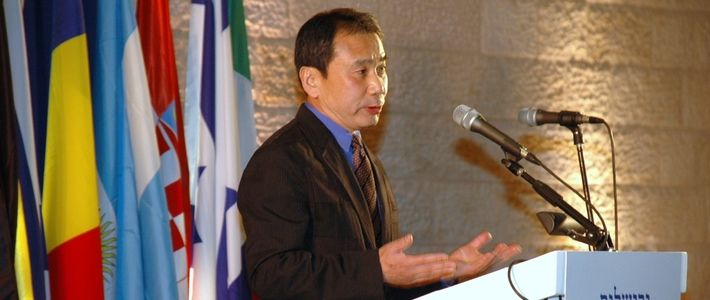
A Wild Nobel Chase: Murakami Haruki and the Elusive Literature Prize
Culture- English
- 日本語
- 简体字
- 繁體字
- Français
- Español
- العربية
- Русский
Murakami Haruki is listed among the “perennial favorites” for the Nobel Prize in Literature in a Reuters article that also lists US writers Philip Roth and Joyce Carol Oates as front-runners; singer Bob Dylan gets a mention as an outside shot. The article is actually from 2008, but not too much has changed in the world of trying to read the minds of the Nobel committee. The same names will undoubtedly be wheeled out before this October’s ceremony.
Surprised by the “Upset”
British bookmaker Ladbrokes has been offering odds on the Nobel Literature Prize since 2005 and Murakami has climbed to the position of all-out favorite (5 to 1 for 2014 at the time of writing). But as anyone who knows anything about betting knows, bookmakers’ odds are influenced by what people bet on, rather than simply reflecting objective probabilities. Hence England’s soccer team makes regular appearances high on the list of British bookmaker favorites for major tournaments, unmatched by corresponding success.
To be fair, Ladbrokes is not that bad at predicting who will get the prize. For the last three years it has had the winners among its favorites, although both Mario Vargas Llosa (2010) and Herta Müller (2009) were outsiders. And it is a financial necessity for the bookmaker to shorten odds on popular writers like Murakami, for whom they will receive vastly more bets, than, say, the Kenyan Ngũgĩ wa Thiong’o (6 to 1) or the Algerian Assia Djebar (10 to 1).
The problem is that when the media uncritically reports that Murakami is the favorite, people believe it and are surprised by the “upset” when he doesn’t win. The fact is that the Nobel Prize selection process is secret, so we cannot even know if he is under discussion as a candidate. The odds list that Ladbrokes puts together is formed through a mixture of rumor, speculation, and wishful thinking by the people betting.
Japan’s Nobel Past
The official Nobel website states that names of the nominees and other information cannot be revealed until 50 years later. The information it provides is actually even more limited, with the full database of nominees only going up until 1950. In that time just one Japanese writer was nominated, the Christian pacifist Kagawa Toyohiko, who was suggested in 1947 and 1948 by two separate Swedish academics.
At the time of writing, the official site also has a little more information on discussions in 1962 and 1963. These are more like intriguing scraps of gossip than in-depth details, though, and there is no mention of the Japanese candidates for 1962. However, the summary of the 1963 discussion is a little more forthcoming, stating that Mishima Yukio was nominated for the first time and was among the six writers the committee considered “most relevant.”
In the end, though, it was decided it would not be right to give Mishima preference over other Japanese writers who had been nominated before. Ultimately Mishima never won the prize, and Kawabata Yasunari instead became Japan’s first literature winner in 1968. We will have to wait a few more years to find out anything about how that happened and a few more decades to learn about what happened when Ōe Kenzaburō was chosen in 1994.
The Wrong Profile
Looking at the Nobel committee’s past record, Murakami is an unlikely pick. With no disrespect intended, he is not really a highbrow author—though his plots can be complex, his sentences are straightforward and the kind of writers the committee usually selects do not sell as many books as he does. To me he seems to be more like one of his favorite authors, Raymond Chandler, wielding great influence on the uncertain border between literature and popular fiction.
As a fan of many of his novels, I don’t quite see why it’s so important for Murakami to win the Nobel Prize anyway. A lot of the writers I like don’t fit the profile. To some it may seem snobbish to favor obscure poets over bestselling novelists, but pragmatically that’s just the way the system works. However, I do think that there are a lot of Murakami supporters out there sticking their money on him and shortening his odds.
Ultimately, I’d say his chances are slim at best, from a gambling perspective, and it would be wiser to bet on a less familiar name. Or if you’re really keen, get over to Sweden and try to pick up on rumors. Leaks from Stockholm are said to have played their part in Tomas Tranströmer’s sudden appearance among the favorites in 2011. And according to one report, it’s bets from Swedish gamblers that have sent Ngũgĩ wa Thiong’o’s odds tumbling.
(Banner photo: Murakami Haruki gives his acceptance speech for the Jerusalem Prize for the Freedom of the Individual in Society in 2009. © Jiji)